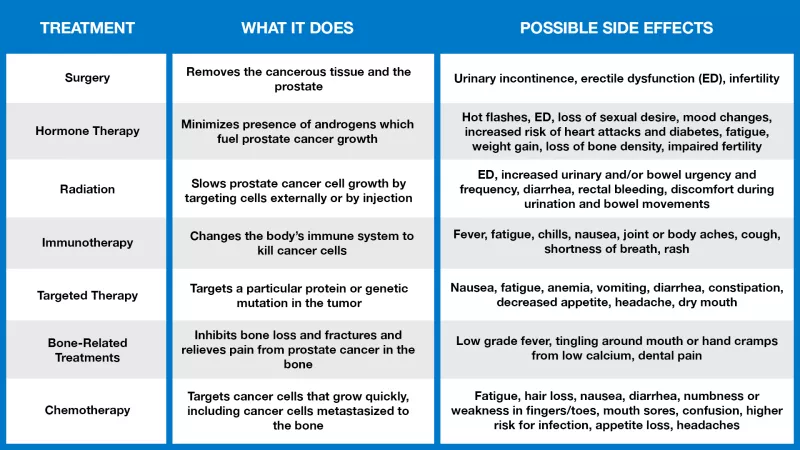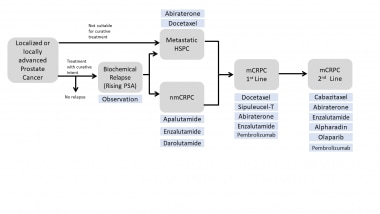See This Report about Best Prostate Cancer Doctor
See This Report about Best Prostate Cancer Doctor
Blog Article
Effective Prostate Cancer Treatment Options for Male
Prostate cancer cells is a common worry amongst men, with therapy options differing depending on the stage and aggression of the disease. Furthermore, approaches like careful waiting and energetic security are obtaining acknowledgment for their duty in managing prostate cancer cells.
Surgery as Therapy Alternative
Surgical intervention stands as a main treatment option for prostate cancer cells individuals in instances where the disease is localized and surgical treatment is regarded appropriate by the healthcare group. Prostate cancer cells surgery intends to remove the cancerous cells from the prostate gland, either partially (prostatectomy) or entirely (extreme prostatectomy) The decision to select surgery is normally based upon various aspects, including the stage of cancer cells, the individual's general health, and possible negative effects.
One common medical technique is robotic-assisted laparoscopic prostatectomy, which provides precision and minimal invasiveness compared to standard open surgical procedure. This strategy utilizes robot arms controlled by the cosmetic surgeon to remove the prostate gland with improved mastery and visualization.
While surgical procedure can be reliable in removing localized prostate cancer cells, it may entail dangers such as urinary system incontinence and impotence. People taking into consideration surgical treatment should take part in extensive discussions with their health care providers to evaluate the advantages and prospective disadvantages of this treatment alternative.
Radiation Therapy for Prostate Cancer Cells
Having actually checked out the role of surgical treatment in dealing with local prostate cancer, the focus now changes to discussing radiation therapy as an additional crucial therapy modality for this condition. Radiation treatment utilizes high-energy rays to target and ruin cancer cells in the prostate gland. There are two primary types of radiation therapy commonly utilized for prostate cancer cells: external beam radiation and brachytherapy.
Outside beam of light radiation entails routing radiation from a machine outside the body towards the prostate. This approach is normally provided daily over several weeks. On the other hand, brachytherapy includes placing contaminated seeds directly right into the prostate, providing radiation from within. This technique enables an extra targeted dose of radiation to the lump while decreasing direct exposure to bordering healthy and balanced tissues.
Radiation therapy can be a standalone therapy for localized prostate cancer or made use of in combination with other treatments, such as surgical procedure or hormonal agent therapy, depending on the phase and aggressiveness of the cancer cells. best prostate surgeon in Mumbai. Typical adverse effects of radiation treatment might include exhaustion, urinary system problems, and bowel problems, which are normally short-term and can be handled effectively
Hormonal Agent Treatment in Prostate Cancer Cells
Hormonal agent therapy is a vital treatment method in handling prostate cancer cells, particularly in situations where the cancer has actually spread out beyond the prostate gland. Prostate cancer cells usually count on male hormonal agents, such as testosterone, to expand. Hormone treatment, also referred to as androgen deprivation treatment, intends to either reduce the production of these hormonal agents in the body or obstruct their results on the cancer cells.
There are different kinds of hormone therapy offered for prostate cancer therapy. One usual approach is the usage of medications called LHRH antagonists and agonists, which work by reducing testosterone degrees. An additional choice is anti-androgens, which block the activity of androgens on the cancer important source cells. Some men may take advantage of a combination of these treatments to effectively manage the go to these guys cancer cells.
Hormonal agent treatment can aid reduce down the progression of prostate cancer, reduce signs, and enhance lifestyle. It is not a curative therapy and might come with side effects such as hot flashes, tiredness, and loss of libido - Best prostate cancer hospital in India. Routine tracking and discussions with health care service providers are necessary to handle the impacts of hormonal agent treatment efficiently
Immunotherapy for Prostate Cancer
Immunotherapy has actually emerged as an appealing treatment method for prostate cancer, offering brand-new methods for combating the disease. Unlike traditional treatments like surgery or radiation, which directly target cancer cells, immunotherapy works by taking advantage of the body's body immune system to recognize and attack cancer cells.
One form of immunotherapy being explored for prostate cancer cells is checkpoint inhibitors. These medications target healthy proteins that protect against the body immune system from attacking and recognizing cancer cells. By obstructing these proteins, checkpoint inhibitors can boost the immune response against prostate cancer cells.
An additional method entails healing vaccines, which boost the immune system to target details antigens discovered on prostate cancer cells. These vaccines can aid the body immune system damage and determine cancer cells he has a good point a lot more efficiently.


Watchful Waiting and Energetic Security
In the world of prostate cancer management, specifically for instances where hostile treatment may not be promptly required, the method of watchful waiting and active monitoring plays a considerable duty. Watchful waiting entails keeping an eye on the cancer cells without prompt therapy, intervening just if the cancer cells reveals signs of development. This method is typically taken into consideration for older individuals with slow-growing tumors or those with multiple health and wellness issues where the threats of therapy might surpass the advantages.
Active security, on the various other hand, involves regular surveillance through PSA examinations, electronic rectal tests, and routine biopsies. It is usually recommended for people with low-risk prostate cancer cells to carefully track any adjustments in the cancer's habits. Therapy options can be reassessed. if there are indications of the cancer cells ending up being more hostile.
Both watchful waiting and active monitoring aim to stay clear of unnecessary treatments and their prospective side effects, such as urinary system incontinence and impotence, while ensuring prompt treatment if the cancer proceeds. These strategies supply an equilibrium between managing the cancer cells effectively and protecting the client's quality of life.
Final Thought

Prostate cancer surgery aims to get rid of the malignant cells from the prostate gland, either partly (prostatectomy) or completely (radical prostatectomy)Having explored the role of surgery in dealing with local prostate cancer, the emphasis currently shifts to discussing radiation treatment as one more vital therapy modality for this disease.Hormonal agent therapy is a vital therapy approach in taking care of prostate cancer, specifically in instances where the cancer cells has spread out beyond the prostate gland. Careful waiting entails keeping an eye on the cancer without prompt therapy, stepping in only if the cancer reveals indicators of development. It is commonly suggested for people with low-risk prostate cancer cells to closely track any type of changes in the cancer cells's habits.
Report this page